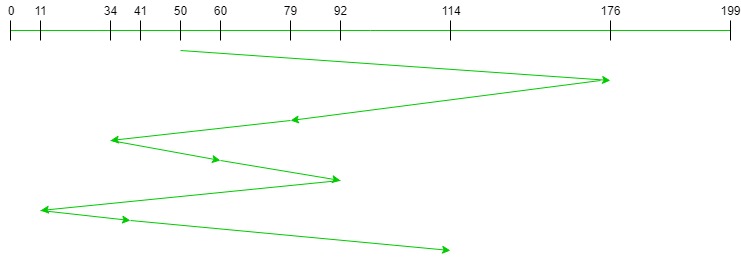先决条件:磁盘调度算法。
给定一组磁盘磁道编号和初始磁头位置,如果使用“先到先得”(FCFS)磁盘调度算法,则我们的任务是查找为访问所有请求的磁道而执行的查找操作总数。
先来先服务(FCFS)
FCFS是最简单的磁盘调度算法。顾名思义,该算法按请求到达磁盘队列的顺序来接受请求。该算法看起来非常公平,没有饥饿(所有请求都按顺序处理),但是通常,它不能提供最快的服务。
算法:
- 让Request数组代表一个数组,该数组存储已按其到达时间的升序请求的音轨的索引。 “磁头”是磁盘磁头的位置。
- 让我们一一按照默认顺序获取轨迹,并计算轨迹到头部的绝对距离。
- 以此距离增加总寻道数。
- 当前服务的轨道位置现在变为新的头位置。
- 转到步骤2,直到未维修请求数组中的所有轨道。
例子:
Input:
Request sequence = {176, 79, 34, 60, 92, 11, 41, 114}
Initial head position = 50
Output:
Total number of seek operations = 510
Seek Sequence is
176
79
34
60
92
11
41
114
下表显示了使用FCFS服务请求的曲目的顺序。 
因此,总寻道数计算如下:
= (176-50)+(176-79)+(79-34)+(60-34)+(92-60)+(92-11)+(41-11)+(114-41)
= 510
执行:
下面给出了FCFS的实现。请注意,距离用于存储磁头和当前磁道位置之间的绝对距离。
C++
// C++ program to demonstrate
// FCFS Disk Scheduling algorithm
#include
using namespace std;
int size = 8;
void FCFS(int arr[], int head)
{
int seek_count = 0;
int distance, cur_track;
for (int i = 0; i < size; i++) {
cur_track = arr[i];
// calculate absolute distance
distance = abs(cur_track - head);
// increase the total count
seek_count += distance;
// accessed track is now new head
head = cur_track;
}
cout << "Total number of seek operations = "
<< seek_count << endl;
// Seek sequence would be the same
// as request array sequence
cout << "Seek Sequence is" << endl;
for (int i = 0; i < size; i++) {
cout << arr[i] << endl;
}
}
// Driver code
int main()
{
// request array
int arr[size] = { 176, 79, 34, 60, 92, 11, 41, 114 };
int head = 50;
FCFS(arr, head);
return 0;
} Java
// Java program to demonstrate
// FCFS Disk Scheduling algorithm
class GFG
{
static int size = 8;
static void FCFS(int arr[], int head)
{
int seek_count = 0;
int distance, cur_track;
for (int i = 0; i < size; i++)
{
cur_track = arr[i];
// calculate absolute distance
distance = Math.abs(cur_track - head);
// increase the total count
seek_count += distance;
// accessed track is now new head
head = cur_track;
}
System.out.println("Total number of " +
"seek operations = " +
seek_count);
// Seek sequence would be the same
// as request array sequence
System.out.println("Seek Sequence is");
for (int i = 0; i < size; i++)
{
System.out.println(arr[i]);
}
}
// Driver code
public static void main(String[] args)
{
// request array
int arr[] = { 176, 79, 34, 60,
92, 11, 41, 114 };
int head = 50;
FCFS(arr, head);
}
}
// This code is contributed by 29AjayKumarPython3
# Python program to demonstrate
# FCFS Disk Scheduling algorithm
size = 8;
def FCFS(arr, head):
seek_count = 0;
distance, cur_track = 0, 0;
for i in range(size):
cur_track = arr[i];
# calculate absolute distance
distance = abs(cur_track - head);
# increase the total count
seek_count += distance;
# accessed track is now new head
head = cur_track;
print("Total number of seek operations = ",
seek_count);
# Seek sequence would be the same
# as request array sequence
print("Seek Sequence is");
for i in range(size):
print(arr[i]);
# Driver code
if __name__ == '__main__':
# request array
arr = [ 176, 79, 34, 60,
92, 11, 41, 114 ];
head = 50;
FCFS(arr, head);
# This code contributed by Rajput-JiC#
// C# program to demonstrate
// FCFS Disk Scheduling algorithm
using System;
class GFG
{
static int size = 8;
static void FCFS(int []arr, int head)
{
int seek_count = 0;
int distance, cur_track;
for (int i = 0; i < size; i++)
{
cur_track = arr[i];
// calculate absolute distance
distance = Math.Abs(cur_track - head);
// increase the total count
seek_count += distance;
// accessed track is now new head
head = cur_track;
}
Console.WriteLine("Total number of " +
"seek operations = " +
seek_count);
// Seek sequence would be the same
// as request array sequence
Console.WriteLine("Seek Sequence is");
for (int i = 0; i < size; i++)
{
Console.WriteLine(arr[i]);
}
}
// Driver code
public static void Main(String[] args)
{
// request array
int []arr = { 176, 79, 34, 60,
92, 11, 41, 114 };
int head = 50;
FCFS(arr, head);
}
}
// This code is contributed by PrinciRaj1992输出:
Total number of seek operations = 510
Seek Sequence is
176
79
34
60
92
11
41
114